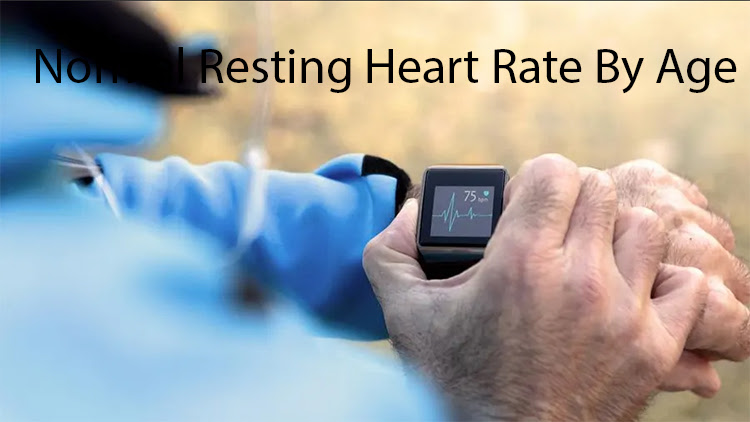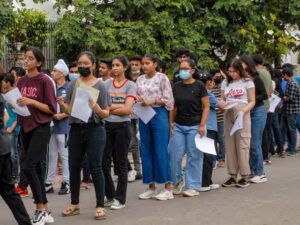Normal Resting Heart Rate By Age During a medical check-up, a nurse typically checks your heart rate along with other vital signs such as temperature, blood pressure, and respiratory rate. Your pulse or heart rate is an essential indicator of your overall health and fitness level. It can help identify specific medical conditions or suggest lifestyle modifications that may be causing your heart rate to exceed the normal range for your age.A high resting heart rate could indicate higher levels of stress, anxiety, or lack of physical activity. It’s crucial to monitor your heart rate regularly so that you can take appropriate steps to maintain a healthy lifestyle and prevent any potential health issues in the future.
Regular exercise, meditation, and a balanced diet can significantly help regulate your heart rate.Moreover, monitoring your heart rate can also help you determine if you are overtraining during workouts or if you need to push yourself harder. Understanding your heart rate zone and training accordingly can improve cardiovascular endurance and overall fitness. In conclusion, regularly monitoring your heart rate can be an important step towards leading a healthy and active life.
Outlines Of Guide
ToggleNormal Resting Heart Rate By Age
The normal resting heart rate (when not exercising) for people age 15 and up is 60 to 100 beats per minute (bpm).
Although a normal heart rate typically ranges from 60 to 100 beats per minute, there are various factors that can cause slight variations in this range. Regular exercise is one such factor, as it can lead to a lower resting heart rate by increasing cardiovascular fitness. Certain medical conditions like thyroid disorders or arrhythmias can also affect heart rate.Stress and anxiety can cause temporary spikes in the heart rate, while some over-the-counter medications like decongestants or caffeine can also have an impact. It is essential to keep track of your heart rate regularly and consult with a healthcare professional if you notice any significant changes or symptoms. Additionally, paying attention to your lifestyle habits like diet and sleep patterns can help maintain a healthy heart rate. By maintaining healthy habits and monitoring your heart rate regularly, you can promote better cardiovascular health and overall well-being.
What Is a Resting Heart Rate?
Resting heart rate is the minimum amount of blood pumped by the heart when the body is at rest and not engaged in physical activity. Monitoring your pulse while relaxed and not ill can help determine this measure, which is an important indicator of cardiovascular health. Lowering your resting heart rate can be achieved through regular exercise, a healthy diet, and stress management. Monitoring changes in your resting heart rate over time is crucial, as sudden increases or decreases could indicate underlying health issues. Factors such as age, medications, and certain medical conditions can affect resting heart rate levels. An excessively low resting heart rate may not necessarily indicate good health and could be linked to other issues, so it’s important to consult with a healthcare professional if concerned.
Why Does Your Resting Heart Rate Matter?
An abnormal heart rate, whether it’s too high or too low, can indicate underlying medical concerns or other health conditions. A heart rate that deviates significantly from your typical resting heart rate warrants attention and may require medical intervention. For example, a consistently high heart rate could be a sign of hyperthyroidism, while a consistently low heart rate could indicate an underlying cardiovascular problem. Therefore, it is essential to monitor your heart rate regularly and seek medical advice if you notice any alarming changes.
An abnormally high resting heart rate could indicate a range of health issues, including hormonal imbalances, an overactive thyroid, anemia, or even a heart rhythm abnormality. According to Hailu Tilahun, M.D., a cardiologist at Virginia Mason Franciscan Health in Seattle, Washington, it is crucial to identify and address the underlying cause of the elevated heart rate promptly. On the other hand, a resting heart rate that’s too low can lead to symptoms like dizziness, lightheadedness, fatigue or fainting. This condition is dangerous and should not be ignored as it could cause serious health concerns. It is always recommended to consult your doctor if you experience any unusual changes in your resting heart rate. Dr. Tilahun explains that varying heart rates may indicate specific medical conditions, but it does not always indicate an issue. This underscores the importance of considering heart rate as a potential indicator for further exploration.
Normal Resting Heart Rate Chart By Age
The normal heart rate varies by age, according to guidelines from the National Institutes of Health. For newborns up to one month old, a normal heart rate is 70-190 beats per minute. Infants aged one to twelve months have a heart rate of 80-160 beats per minute. Children aged 1-10 years typically range from 70-120 beats per minute, while adults usually have a resting heart rate between 60-100 beats per minute. It’s worth noting that factors like physical activity, medications, and health conditions can also influence heart rate.
Age & Normal Resting Heart Rate
| Age | Normal Resting Heart Rate |
|---|---|
| Newborns ages 0 to 1 month | 70 to 190 bpm |
| Infants 1 to 11 months old | 80 to 160 bpm |
| Children 1 to 2 years old | 80 to 130 bpm |
| Children 3 to 4 years old | 80 to 120 bpm |
| Children 5 to 6 years old | 75 to 115 bpm |
| Children 7 to 9 years old | 70 to 110 bpm |
| Children 10 years and older and adults (including seniors) | 60 to 100 bpm |
| Athletes in top condition | 40 to 60 bpm |
Knowing your normal “maximum” heart rate during vigorous activity and your “target” heart rate for your age is essential when engaging in physical activities. To determine your normal maximum heart rate, subtract your age from 220. On the other hand, during moderate-intensity activities like walking, your target heart rate should be around 50% to 70% of your maximum heart rate. During more intense activities such as running or weightlifting, it should be about 70% to 85% of your maximum heart rate.The American Heart Association provides a general guide for average maximum heart rates and target heart rate zones by age for adults. This information can help individuals tailor their workouts to achieve optimal results while maintaining a healthy and safe level of physical activity. It is crucial to monitor your heart rate during exercise to avoid overexertion or injury and ensure that you are working within the appropriate range for your age and fitness level.
Average Maximum Heart Rate (100%)
| Age | Target Heart Rate Zone (50% to 85%) | Average Maximum Heart Rate (100%) |
|---|---|---|
| 20 years | 100 to 170 bpm | 200 bpm |
| 30 years | 95 to 162 bpm | 190 bpm |
| 35 years | 93 to 157 bpm | 185 bpm |
| 40 years | 90 to 153 bpm | 180 bpm |
| 45 years | 88 to 149 bpm | 175 bpm |
| 50 years | 85 to 145 bpm | 170 bpm |
| 55 years | 83 to 140 bpm | 165 bpm |
| 60 years | 80 to 136 bpm | 160 bpm |
| 65 years | 78 to 132 bpm | 155 bpm |
| 70 years | 75 to 128 bpm | 150 bpm |
How to Measure Your Heart Rate At Home
Monitoring your overall health and fitness involves checking your heart rate, which can be done using smartwatches or manually finding your pulse. To find your pulse manually, gently press your index and middle finger against your wrist or neck and count the beats you feel within 15 seconds. Multiply that number by four to get your heart rate per minute. While this method may take longer than using a wearable device, it can still provide accurate results. If you have concerns about your heart rate or overall health, it’s important to consult with a medical professional.
Measuring your heart rate is a straightforward process that involves placing your index and middle fingers gently on the underside of your wrist, just below the base of your thumb. You should be able to feel your pulse through this method. Alternatively, you can measure your heart rate by placing two fingers on one of the carotid arteries located on either side of your neck. Count the number of beats you feel for 15 seconds and multiply by four to calculate your heart rate per minute. Monitoring your heart rate regularly can help you gauge your fitness level and ensure that you are exercising at an appropriate intensity.
Additional locations where you can monitor your heart rate are:
- Groin
- Temple
- Back of the knees
- Top or inside of the foot
Measuring your heart rate is a simple but useful way to assess your cardiovascular health. To do this, you need to find your pulse and count the beats for either 15 or 30 seconds, depending on the method you prefer. If you count for 15 seconds, multiply the number of beats by four to get your heart rate per minute. Alternatively, if you count for 30 seconds, multiply the total by two. It’s important to check your resting heart rate after being physically inactive for at least 10 minutes to get an accurate reading. A lower resting heart rate generally indicates better cardiovascular fitness and overall health.
Checking your resting heart rate can be done at any time of the day, according to Dr. Tilahun. However, it is important to note that after physical activity, the heart rate may still be elevated. Similarly, checking your heart rate after long periods of rest or meditation may not accurately reflect your actual resting heart rate. For reliable and accurate metrics of oxygen saturation, perfusion index, and heartbeats per minute, hospital-grade pulse oximetry is recommended for everyone. This technology ensures unparalleled accuracy in determining your vital signs.
What If I Can’t Locate My Pulse?
If you can’t find your pulse on your wrist, there are other places on your body where it may be stronger. The carotid artery, located in the neck, is one such location. However, it’s important to be careful when checking for a pulse on the neck as excessive pressure can lead to injury. Other areas where you can check for a pulse include the inner elbow and behind the knee. If you’re still having trouble finding your pulse, it’s best to seek medical attention.
According to Dr. Tilahun, when checking the pulse on the carotid artery, it is important to exercise caution as excessive pressure can trigger a reflex that can cause dizziness, lightheadedness or fainting. The carotid artery is located in the neck and supplies blood to the brain, so applying too much pressure can lead to a decrease in blood flow and oxygen supply to the brain which can be dangerous. It is essential to use gentle pressure when palpating this area to avoid any negative consequences.
What Causes a High Resting Heart Rate?
A high resting heart rate is associated with increased risks like high blood pressure, weight gain, and reduced physical fitness. Lifestyle factors such as stress, lack of physical activity, poor diet choices, smoking, and excessive caffeine consumption can contribute to this. Resting heart rate varies based on age, gender, genetics, and overall health. Normal range for adults is 60-100 bpm but athletes or regular exercisers may have a lower resting heart rate due to their fitness level. Monitoring your resting heart rate regularly can indicate your overall health. If you notice a significant increase over time or experience symptoms like chest pain or shortness of breath, consult a healthcare professional for evaluation and treatment.
Other potential reasons for an elevated heart rate may include:
- Fever
- Pain
- Infection (including bacterial, viral and rarely fungal infections)
- Dehydration
- Poor or disrupted sleep
- Caffeine, alcohol or nicotine intake or withdrawal
- Stress and anxiety
- Smoking
- Use of over-the-counter decongestants
- Poor physical condition
How To Lower Your Resting Heart Rate
When your resting heart rate falls within the normal range for your age, your heart muscle doesn’t need to exert as much effort to maintain a steady blood flow. If an individual experiences a higher heart rate after a period of physical inactivity, despite minimal changes in their overall health, Dr. Tilahun suggests that this elevated heart rate may signal the need for increased physical activity to lower it.
Maintaining a resting heart rate within the normal range of 60 to 100 beats per minute is crucial for overall heart health. If your heart rate is higher than this range, regular physical activity can help bring it down. It doesn’t have to be a structured exercise routine; activities like walking, gardening, or even mowing the lawn can be beneficial. According to Tilahun, engaging in any form of regular activity can help improve cardiovascular health and reduce the risk of heart disease. In addition to physical activity, maintaining a healthy diet and avoiding smoking can also contribute to a lower resting heart rate.
When engaging in physical activity, it is common for the heart rate to increase, which can sometimes cause concern. However, this is a natural response and nothing to worry about. In fact, regular exercise can actually lead to a lower resting heart rate over time. This is because exercise strengthens the heart muscle, making it more efficient at pumping blood throughout the body. It also improves cardiovascular health and reduces the risk of heart disease. Therefore, it is important to make physical activity a regular part of your routine for overall health and well-being.
How Much Do Dental Implants Cost In 2024?
Normal Blood Sugar Levels By Age Chart
Summary
An increase in heart rate due to stress, as well as excessive consumption of caffeine and alcohol, is usually not a cause for concern. However, it is still important to talk to your healthcare provider about these situations. They can provide guidance on how to make necessary lifestyle changes that can help improve your heart health. In some cases, certain medications or medical conditions may also contribute to a higher heart rate, so consulting with a clinician is always recommended. By working closely with your healthcare provider and making positive lifestyle changes, you can take steps towards maintaining a healthy heart rate and overall cardiovascular health.
According to Dr. Tilahun, individuals without an acute condition that could cause an increased heart rate should also consult with their doctor if their resting heart rate remains above 100 beats per minute for several days. If there is no clear explanation for the persistent elevation of heart rate, it is advisable to seek medical advice. It is important to note that an elevated resting heart rate can be a symptom of underlying health issues such as thyroid problems, anxiety, or dehydration. Therefore, it should not be taken lightly and prompt medical attention is recommended to identify any potential health concerns.











































